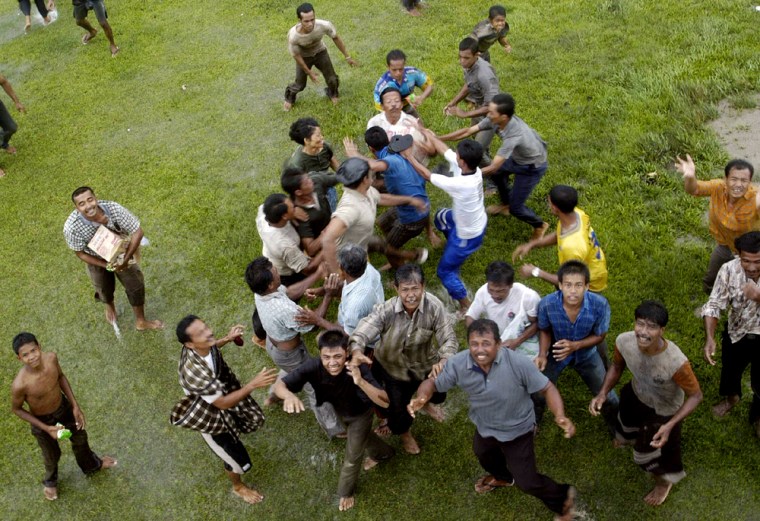One of the largest U.S. military relief operations in history helped speed the pace of aid to desperate victims of Asia’s tsunami disaster Sunday, delivering critical supplies to haggard survivors in severe need of food and water.
Flying in and out of flattened villages, American helicopters carried water, biscuits and other bare necessities to ravaged Indonesian communities, some of which had been impossible to reach in the week since an earthquake and tsunami ravaged coastlines in Asia and Africa.
Around the devastated Indian Ocean rim, an outpouring of global aid began to reach survivors.
With the overall death toll forecast to hit 150,000, the world continued to shower unprecedented compassion on the suffering. The United Nations said governments and global organizations have pledged about $2 billion in tsunami relief, a quarter of it from Japan — the single largest donor so far.
U.N. Secretary General Kofi Annan plans to arrive in Jakarta on Thursday to coordinate aid efforts at a donors’ conference in the Indonesia, where the catastrophe claimed more than 94,000 lives.
Secretary of State Colin Powell, also due at the conference, defended the Bush administration’s response to what he called one of the world’s worst catastrophes.
“It’s been seven days and in seven days, we have launched a carrier battle group. We have launched an amphibious battle group. We have contributed $350 million,” Powell said Sunday on NBC’s “Meet the Press.” The United States’ initial pledge of $35 million drew criticism.
Obstacles to aid
Disaster victims’ needs remain enormous, and relief efforts were still hampered by the destruction of roads, ports and airfields. The arrival of U.S. warships and helicopters boosted the relief drive and offered a glimpse of the scope of devastation from the Dec. 26 calamity.
“There is nothing left to speak of,” said Lt. Cmdr. Jeff Vorce, of San Diego, among the helicopter pilots flying from the USS Abraham Lincoln to the northern tip of Sumatra, where last Sunday’s tsunami took its greatest toll.
The giant aircraft carrier and four other U.S. Navy vessels, crewed by more than 6,500 sailors and Marines, moved into position Saturday off Indonesia to launch one of the largest U.S. military operations in southern Asia since the Vietnam War.
From a low-flying helicopter, the scene for some 70 miles down the shoreline from the Aceh provincial capital, Banda Aceh, was that of a veritable skeleton coast. Villages, one after the next, were obliterated. Concrete foundations were all that remained of most structures.
Only a few mosques remained intact, surrounded by wasteland. Thousands of emerald green rice paddies had been peeled away, replaced by fetid swamps, mangled tree trunks and sea slime.
Americans delivered aid to tsunami-shattered communities along Sumatra’s coast. In the town of Keude Teunom, 8,000 of its 18,000 people died. A few minutes after landing, the helicopter lifted off and another descended. The U.S. military was also sending a flotilla of Marines and water purifying equipment to Sri Lanka.
The aid deliveries were a mere drop in an ocean of need — but priceless nonetheless, said Indonesian military spokesman Ahmad Yani Basuki.
“They’ve helped us reach places we have not had the time, or manpower, or equipment to go to,” said Basuki, noting that Americans had helped clear helicopter landing spaces for the arrival of future supplies. “It really speeds up the distribution of aid to (Sumatra’s) west coast.”
Cautious optimism
For the first time since the tsunami struck a week ago, humanitarian agencies voiced optimism.
“I’m happy to report that we are not having too many difficulties with our distribution,” said Heather Hill, a spokeswoman for the World Food Program, which passed out 50 tons of rice and eight tons of biscuits and dried noodles in Aceh province on their first day of operation Saturday.
Four Indonesian navy frigates loaded with supplies arrived off the coast of the fishing village of Meulaboh, one of Aceh’s worst-hit spots. Others flew into Meulaboh by helicopter, including five American doctors from the USS Shoup and teams from the Japanese Red Cross and Spanish Red Cross with enough supplies to care for 30,000 people and provide clean water for 40,000.
“Survivors have nothing,” said Red Cross health specialist Caroline Dunn in Geneva. “Shelter, food, clean water and medicine all are lacking.”
In Banda Aceh, a main delivery point for aid, relief centers operated out of tents and passed out boxes of supplies to orderly crowds. Truck convoys delivered goods in steady streams, as planes constantly unloaded aid at the Banda Aceh airport.
In parts of Aceh, some were already starting to look to the future.
UNICEF spokesman John Budd said refugees were anxious to get their children back to school and resume normal life. He said the agency was planning to establish 600 schools to serve 120,000 youngsters in stricken parts of Sumatra.
The disaster’s confirmed toll surpassed 137,000. U.N. officials said they expected it would reach 150,000, although the final total may never be known. Five million people were homeless.
In Sri Lanka, where nearly 30,000 people were killed, more than 20 countries have sent or pledged aid. Medical teams from Japan, Israel, China, India and Russia were among the more than 500 local and foreign physicians dispatched to the disaster zone. Rice, sugar and lentils were being transported daily on two dozen trucks from the U.N. World Food Program.
In Thailand, where the death toll approached 5,000, Prime Minister Thaksin Shinawatra said the world’s compassion and generosity was “more than we expected.”
“We have had no experience like this before,” he said. “But now, we have a lot of expertise and experts to help us. That is what we are really happy with.”
